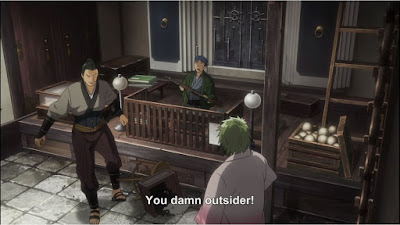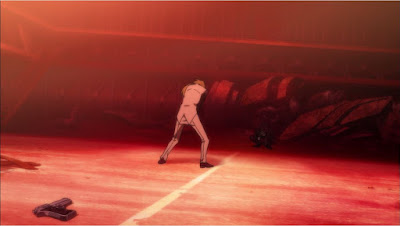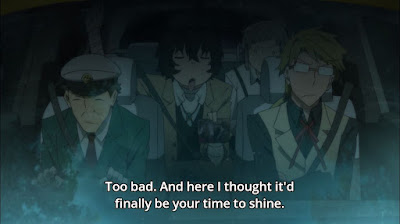Right back into the fray, now, straight from last episode's dealings with a bomb. Now we shall encounter another bomb--and perhaps, we shall advance the Port Mafia story here a little bit more with episode 8 of Bungou Stray Dogs: Teach a Man To Kill, then To Die. One interesting thing now: we shall see another member of the Detectives in action. Thus, spoilers ahead, intentional or otherwise.
What an interesting way to start, all mysterious with the little girl and her "finding" Dazai. According to what he said, this might be something bad.
...But then they held off on that. Yes, some references to that, saying "Where is Dazai" and such. However, as always, they managed to turn it into a big joke. Yes, how does a man with a suicide fetish stay well and healthy?
True, the first half will be all laughs; I mean, just look at that scene. Once more I seemed to have a good long bout of laughter as Junichirou confessed that he's been "treated" by Dr. Yosano four times.
Speaking of the lady that struck fear into the hearts of the Detectives, here she is. Once more the story takes to one seemingly overused scene, where Atsushi must bring all her shopping goods. But then, what an epic way to introduce someone's other side: threatening to cut off a man's hand, who tried to threaten her. Well, woman power, I suppose. No blaming that.
And then, all of a sudden as usual, the show took on a darker tone, truer to its seinen genre, with a (or rather, yet another) bomber terrorizing the train.
And it seems that this one won't disappoint. Surely we always need another deranged physician in this story, and this time, this one is much more philosophical.
Then, I must say, I quite enjoy Atsushi's fight with the little girl, Kyouka. On one side, it was an extremely bloody mess, no question. On the other, even from the tone of her words we could tell that Kyouka's nothing more than a brainwashed minion.
It went from just subtly emotional to philosophical with Atsushi's past being thrown back in: all the people in the train were dead or endangered because of him, and once more we see the recurring theme from when he was kicked out of his orphanage--but this time, seems he managed to find a reason to stay alive, to fight for others. Now this is character development.
Meanwhile, Yosano. Not your regular doctor after all. It was epic, how she 'explained' about death to the guy. This one was philosophical in quite a hilarious, but touching somewhere inside.
One point to make was, yes, indeed, what a convenient ability to have, having to make them even nearer to death to heal someone. While I'm not a fan of her just spilling all her abilities, seems there's no other way around; she did nicely explain the fear around her.
And the finale? Well, once more it retained its emotion, and the presence of a character development.
Yes, it was through a big pep talk by Atsushi. And it was just dumb how he was the one that triggered the bomb. However, hearing Kyouka's voice with some kind of fear, perhaps along with hope not to kill anyone else, she jumped off the train.
...to which Atsushi jumped and saved her. Yes, he'll never let anyone die again, as per his vow.
On a side note, seeing the next episode's teaser, these two might be something. We don't know yet.
Oh, so that was where Dazai went all these time, to the lair of the Mafias.
In that case, then, nothing else to comment for this quite packed and gory episode. Now we got the little girl and Dazai missing as something to look toward to, apart from being introduced a helpful-but-mean doctor. Until next time.
Uh-oh. Forgot to press publish all those days ago. Dammit.





















































